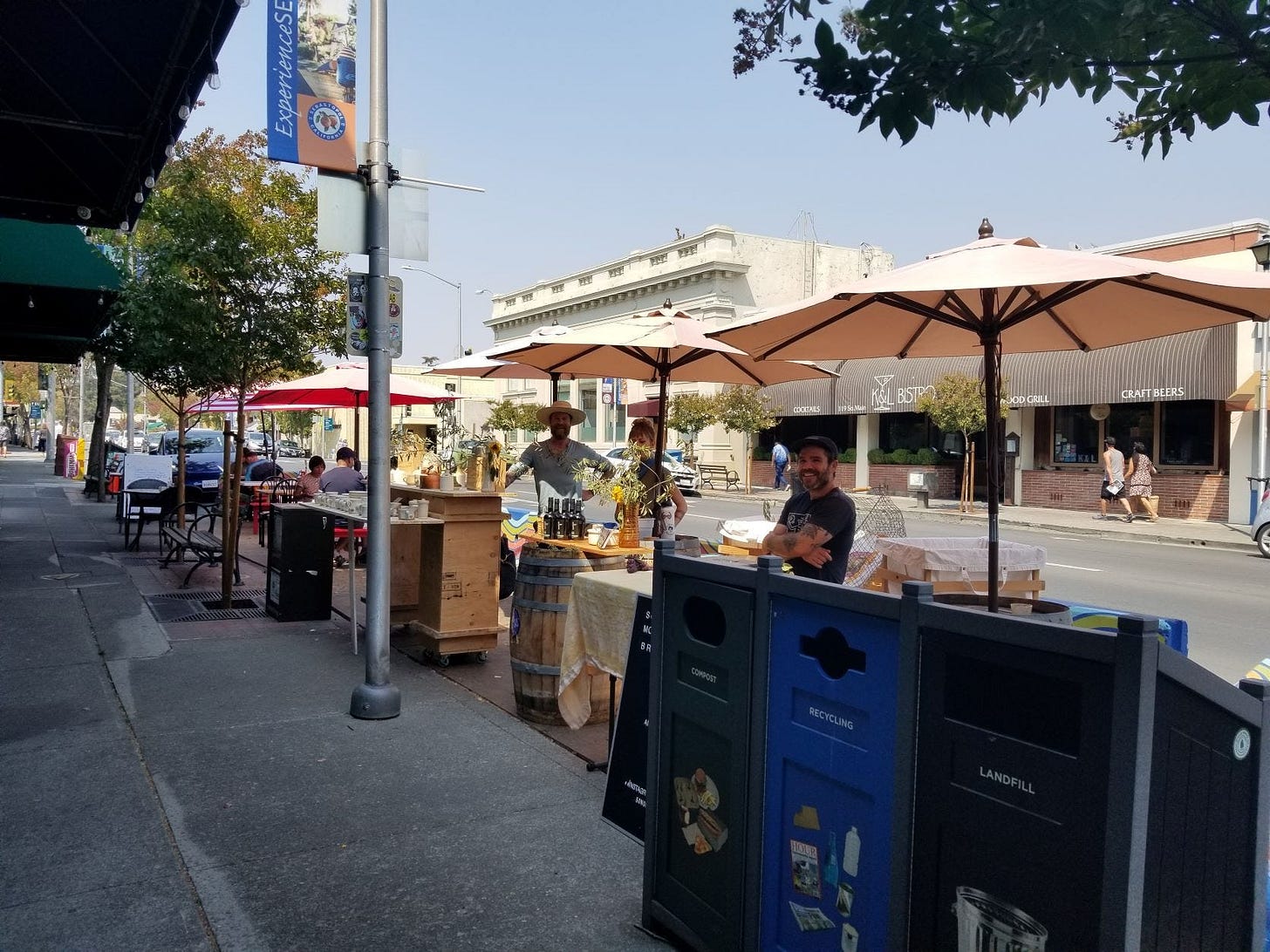The end of the parklet experiment
The last parklet (in front of Retrograde Coffee and the Sunshine Cafe) is being removed today

Sebastopol’s parklets started out as a New Urbanist* fantasy, but became a business necessity for some stores and cafes during the darkest days of COVID and then, as that threat waned, an outdoor seating alternative for customers.
There were three parklets at first—one in front of Screamin’ Mimi’s, one in front of the now defunct People’s Music and one in front of Retrograde Coffee and Sunshine Café.
The first two were taken down in January of this year, and the last one (the one in front of Retrograde and Sunshine) is due to be disassembled by the city today, according to Director of Public Works Dante Del Prete.
Danielle Conner, the owner of Retrograde, is philosophical about the end of the parklet.
“I appreciate being able to have the parklet out in front of Retrograde and Cafe Sunshine for nearly three years,” she said. “It was instrumental in helping us get through the COVID-19 pandemic by allowing us to have outdoor seating. I thank the city and everyone who helped make it happen.”
“We still have lots of outdoor seating behind our cafe in the courtyard,” Conner said. “I hope this will encourage folks to utilize that open space.”
Why the parklets are going away
All three parklets were located on either Hwy. 12 or Hwy. 116—which are owned and controlled by Caltrans (the California Department of Transportation). Caltrans allowed the creation of parklets during COVID, but when the governor declared the COVID emergency over in 2022, Caltrans informed municipalities that if they wanted to keep their parklets, they had to pay “rent” to Caltrans—about $6,000 a year per parklet. (To be fair, this was Caltrans’ policy for parklets before COVID happened; Caltrans just suspended it during the pandemic.)
The Sebastopol City Council decided it didn’t want to pay for the parklet in front of People’s Music, which rarely got used. It closed the parklet in front of Screamin’ Mimi’s, which was very popular, because the city had entered into negotiations with Caltrans to transfer that little strip of Depot Street in front of Screamin’ Mimi’s from Caltrans to the city. They kept open the possibility of reopening the parklet once the city owned that section of Depot Street and didn’t have to pay Caltrans for the privilege of having a parklet there.
That left the parklet in front of Retrograde and the Sunshine Cafe, which got a lot of use, even as the threat from COVID receded. In 2022, the city council set aside $85,000 for engineering, design and construction of a more attractive parklet for this site, but when the extent of the city’s budget woes became apparent this year, that plan was cut from the budget.
When Caltrans informed the city that it had to remove the Retrograde/Sunshine parklet by the end of the year, there was nothing left to do but comply.
Are there more parklets in Sebastopol’s future?
Local architect Paul Fritz, the town’s leading expert on and advocate of parklets, hopes so.
“I am very disappointed that the city did not make more of an effort to keep the parklets in place,” he said. “I think the parklet at Retrograde/Sunshine Café has been very successful and an asset to Main Street. I also feel that the mini-plaza at Mimi’s should have been allowed to stay. It makes me happy to see people hanging out enjoying themselves downtown, and with the removal of those spaces, there really are no other places for that to happen. And people attract people. Public spaces like these are what we need to support our downtown businesses.”
Fritz realizes the city is in a budget crunch, but said that needn’t get in the way of a vibrant parklet program.
“There has been this strange approach to the parklets in that the city seems to feel that the city needs to design/build and install the parklets, evidenced by the city initially setting aside $80,000 to do so,” Fritz said. “I never expected the city to put up money for the parklet installation. Typically parklets are sponsored by the adjacent businesses. They pay for the design and installation, and maintenance. And we had willing businesses, and there are also resources available in the form of grants for these type of placemaking installations. And there is no reason why a single parklet would need to cost $80,000. They can be quite simple, but still nice. The city never seriously considered any of that.”
Danielle Conner of Retrograde said she would be happy to see another parklet in the neighborhood—perhaps on Barnett street next to the courtyard the cafe shares with other businesses in the complex. Barnett is a city street, which means the council could approve the construction of a parklet without going through Caltrans.
But don’t hold your breath. For now, the council is fully occupied with getting the city on a firmer financial footing—and niceties such as parklets may have to wait until the council has more bandwith.


Too bad about the loss of the parklets. As you noted in the article, they seemed to add vitality to the downtown. I hope the city council will see this as positive for our town.
Removing the parklets is really too bad. You find outdoor eating areas in front of establishment in most major cities in the world. In addition, to being a nice place to sit and meet they are a boost for businesses and downtown areas already struggling to bring people in. Very sad.